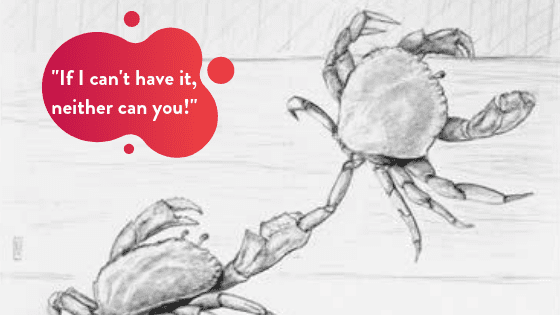If I can’t have it, neither can you.
The Crab in the barrel mentality is a metaphor derived from a pattern of behavior noted in crabs when they are trapped in a bucket. While anyone Crab could easily escape, its efforts will be undermined by others, ensuring the group’s collective demise. It is a way of thinking that says If I can’t have it, get it or do it, then neither can you, and if you try, then I would go out of my way to bring you down.
The Crab in the barrel mentality can be observed everywhere, such as the workplace, families, friends, and places of worship. The moment you try to leave the stereotype or comfort zone, the crabs in the barrel are always there to bring you down to their level. It is not a great place to be in as you naturally expect people in your clan to be happy for you, but they usually are not.
They begin to call you names such as you are a sell-out, you sold your soul to the devil, you have changed (seriously how are you not supposed to change? ), that is the hallmark of growth. This behavior eventually leads to envy, jealousy, hatred, and other harmful actions against the successful individual. It can be exceedingly hurtful as you notice the behavior from people very close to you, your family members, and friends. They smile in your face but backstab, gossip and insult you in your absence
A ship is safe in harbor, but that’s not what ships are for.- John A. Shedd
Author Steve Pressfield, in his very great book, The War of Art, share some very great insight about the crab in the barrel mentality:
Resistance by definition is self-sabotage. But there’s a parallel peril that must also be guarded against: sabotage by others.
When a writer begins to overcome her Resistance—in other words, when she actually starts to write—she may find that those close to her begin acting strange. They may become moody or sullen, they may get sick; they may accuse the awakening writer of “changing,” of “not being the person she was.” The closer these people are to the awakening writer, the more bizarrely they will act and the more emotion they will put behind their actions. They are trying to sabotage her.
The reason is that they are struggling, consciously or unconsciously, against their own Resistance. The awakening writer’s success becomes a reproach to them. If she can beat these demons, why can’t they?
Often couples or close friends, even entire families, will enter into tacit compacts whereby each individual pledges “(unconsciously) to remain mired in the same slough in which she and all her cronies have become so comfortable. The highest treason a crab can commit is to make a leap for the rim of the bucket.
The awakening artist must be ruthless, not only with herself but with others. Once you make your break, you can’t turn around for your buddy who catches his trouser leg on the barbed wire. The best thing you can do for that friend (and he’d tell you this himself, if he really is your friend) is to get over the wall and keep motating.
The best and only thing that one artist can do for another is to serve as an example and an inspiration.
In his book, Hustle Harder, Hustle Smarter, Curtis “50 Cent” Jackson also shares some very great insights on the crab in the barrel mentality:
On the streets, there just isn’t enough space for both success and suckers. The quicker you understand that, the quicker you’ll get the most out of your journey.
Another mistake people make time and time again is that after they’ve found success, they feel they still owe something to the place they came from. This is especially prevalent in the African American community. When a black person from the hood reaches a certain level of success, they seem to feel obligated to maintain their roots.
When the Irish, Italian, and Jewish immigrants started making money, the first thing they did was beat it out to the suburbs.”
“I’ve known a lot of people who made that mistake, and some have paid the ultimate price for their unwillingness to walk away. “A tragic example was my friend and mentor Jam Master Jay, who was from Hollis, Queens.”
“Once they hit the big time, the rest of Run-DMC left Queens and never looked back—Rev Run and DMC went to New Jersey, and their manager, Russell Simmons, set up shop in Manhattan. But Jay stayed in Queens his entire life. He opened a recording studio in Jamaica, where he taught aspiring local rappers—myself included—the finer points of constructing a song.”
“The crab-in-the-barrel mentality is what killed Nipsey, just like it killed Jay and so many other successful black folks who stayed in their community after they found success. That’s why, when I started making legitimate money, I left the hood and never looked back. Sure, I’ll visit from time to time. But I’d never move back permanently. If I did, there’s zero question I would have been negatively impacted.”
Whenever you find success in life, there will be people who believe some of it belongs to them. Bang ’Em was that sort of person. When you remove them from your life, instead of looking in the mirror, they get angry at you.
It is a tough place to be when you begin to deal with crab minded people as they would always pop up with their self-limiting behaviors.
Characteristics of Crab Minded People
- They detest the fact that you want to rise above your circumstances as an insult to them – Misery loves company: You going to hear things like you are condescending, you getting proud, you think you better than everyone now ya da ya da
- They do not understand that the barrel is not their natural habitat.
The crab’s natural habitat is the sea, but they have become so comfortable in the barrel that they don’t want anyone else to get freedom. - The moment you get to live a life of abundance and fulfillment, it begins to get some people uncomfortable, but you need to move ahead.
- They want the prize but are not willing to pay the price.
People do not want to pay the price, but they want to win the prize of success, there is nothing like an overnight success. Success requires daily hustle, grind and hard work day in day out. You would see them downgrading your grind and hustle; this might derail you if you listen to them. We are all going to go through this at one point or the other - They are uncomfortable with the change they see in you.
Crab minded individuals can’t stand you excelling or breaking the out of the box they put you in, your success reminds them what they could have become had they followed their dreams or dared to follow their bliss. - They blame the fisherman for putting them in the barrel, but if they work as a group, they can get out of the barrel, but they usually don’t do it.
People with this kind of mindset are specialists in complaining and blaming everyone for their situation; they blame the government, their parents, the society, their schooling, everyone is the cause of their issue.
How to Deal with Crab Minded Individuals
- Leave the Barrel
One of the ways to deal with the crab in the barrel mentality is to leave the barrel, which can be your hood where you grew up in, leaving your family members for a while, leaving the country, this allows you to set boundaries between you and their negative vibes, - Set Boundaries
You need to set boundaries for yourself so as not to get sucked in with their emotional guilt-tripping, set clear boundaries on behaviors you are going to accept, and what you are willing to tolerate.
- Develop a thick skin
You have to develop a thick skin for their manipulation and their toxicity, focus on your goals, build in silence and shock them with your results as your results would always cancel the insults. - Beware of misguided loyalty.
Do not let misguided loyalty make you stay in the barrel as people with crab minded mentality are master manipulators. They would remind you how far you have known each other, how blood is thicker than water, don’t fall for it, the moment you begin to see them exhibit crab-minded behavior, maintain your distance and create boundaries. Positive vibes only. - Don’t let survival remorse let you go back to the barrel.
Survivor Guilt is a mental condition that occurs when a person believes they have done something wrong by surviving a traumatic event when others did not, often feeling self-guilt. Don’t apologize for becoming successful and going back to the hood (the barrel) would not help anyone.
As Pressfield advised, “The best and only thing that one artist can do for another is to serve as an example and an inspiration.” You can only serve as a source of inspiration for the individuals who want to be inspired. Life is too short to be dealing with crab minded individual, leave your mark here and let prosperity judge you.
All the best in your quest to get better. Don’t Settle: Live with Passion.



1 Comment
Pingback: "Stay Safe!": The Rise of Safetyism - Anthropology - The Secular Heretic